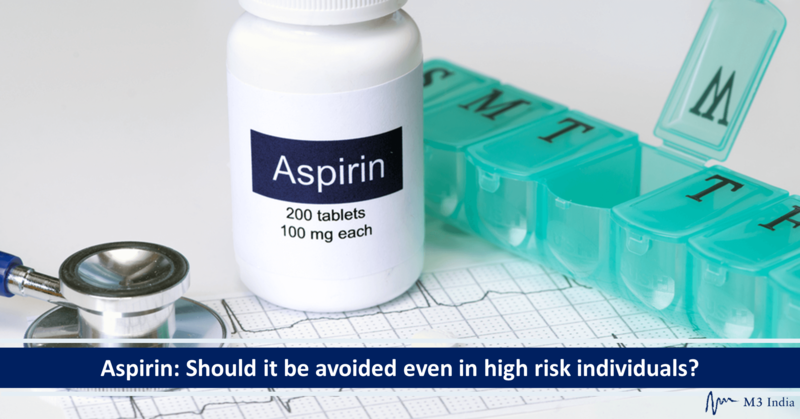Should we avoid using aspirin for primary prevention even in high risk individuals?
M3 India Newsdesk Dec 02, 2019
Prof. Dr. Sundeep Mishra contests the blanket strategy approach of prescribing 100 mg aspirin to all individuals considered to be at high risk for atherosclerotic cardiovascular disease (ASCVD).

Atherosclerotic cardiovascular disease (ASCVD) is the leading cause of mortality worldwide. However, most of the mortality could be attributed to the induction of a thrombogenic process in these patients. In the early 90s Vane revealed that aspirin could limit the formation of thromboxane A2 by interfering with the cyclooxygenase (COX) activity of prostaglandin endoperoxidase synthase. This in turn could inhibit platelet aggregation and vasoconstriction and thus play a role in ASCVD.
The idea of taking a small aspirin pill a day to prevent the development of serious ischaemic events has fascinated researchers ever since, so much so that aspirin has become one of the most widely used drugs in pharmaceutical history. While this strategy was clearly proven to be effective in patients who have already developed an event i.e., secondary prevention, its use for primary prevention among patients at higher risk of developing cardiovascular events (CVE) is controversial.
Early large-scale primary prevention trials; Physicians’ Health Study, Women’s Health Study and a relatively later (2009) Antithrombotic Trialists Collaboration (ATTC) conducted a meta-analysis of six primary prevention trials involving 95,000 patients provided evidence of upto modest cardiovascular benefits but with an increased risk of bleeding. In this meta-analysis there was a 12% reduction in vascular events among patients receiving aspirin, while there was a 50% higher risk of bleeding. While there was no consistent benefit of mortality reduction there was indeed a suggestion that cancer related death (particularly GI cancers) may be reduced. However, these early prevention trials of aspirin were conducted at a time when smoking was common, blood pressure control suboptimal, and aggressive lipid lowering rare. Furthermore, over the years there has not only been an improvement in the treatment of diabetes, hypertension and dyslipidaemia, there is an increase in awareness of ASCVD and use of lifestyle changes, diet and exercise regimens to prevent it.
All this might contribute to a net decrease in the cardiovascular events (CVE) rate and limit the net benefit of aspirin for primary prevention. Thus, the risks and benefits of preventive aspirin in current preventive practice may be quite different. As a matter of fact, after the ATTC meta-analysis, four more trials have evaluated the use of aspirin for primary prevention. Expectedly, none of these trials showed a clear benefit of aspirin. However, the situation may be different in higher risk situations where the risk may be higher than low risk primary prevention group, albeit lower than secondary prevention group. These higher risk groups may comprise those with diabetes, older patients or patients with other high risk features. Trials addressing each of these subgroups have been recently reported.
ASCEND
The ASCEND (A Study of Cardiovascular Events in Diabetes) trial, which randomised 15,800 participants with diabetes to either 100 mg aspirin daily or a matching placebo was published in The Lancet. It revealed that the use of aspirin at a dose of 100 mg daily for 7.4 years resulted in a 12% lower risk of serious vascular events but also a 29% higher risk of major bleeding events 9both statistically significant). However, there was no effect of aspirin use on the rate of death from vascular causes.
ARRIVE
The ARRIVE (Aspirin to Reduce Risk of Initial Vascular Events) trial investigated high-risk participants without diabetes. However, during 5 years of follow-up among 12,546 participants, the composite primary outcome (myocardial infarction, stroke, unstable angina, transient ischaemic attack, or death from cardiovascular causes) was only 4% lower (not significant) but the gastrointestinal bleeding events where more than 2 times with aspirin (statistically significant) although the rate of fatal bleeding events, and all-cause mortality were no different between the two groups.
ASPREE
The ASPREE (Aspirin in Reducing Events in the Elderly) trial, which was published in NEJM, involved 19,114 older participants (≥ 70 years) from USA and Australia, randomised to receive 100 mg per day of enteric-coated aspirin or placebo and followed for up to 5 years. Like other trials here, again the use of aspirin conferred no benefit with respect to the pre-specified composite primary end point (death, dementia, or persistent physical disability) or even secondary end-points like CVS events yet the risk of major bleeding was 39% higher with aspirin than with placebo (statistically significant).
More disturbingly, the rate of the secondary end point of death from any cause was 14% higher with aspirin than with placebo (95% CI, 1.01 to 1.29). Thus, this finding is at odds with the findings of previous primary prevention trials of aspirin as also with the results of the ASCEND and ARRIVE trials. Interestingly, the potentially higher mortality with aspirin was driven by an unexpected 31% higher cancer-related death with aspirin (95% CI, 1.10 to 1.56).
All these 3 trials ASCEND, ARRIVE and ASPREE trials add to a growing body of evidence that aspirin does not provide a net benefit when prescribed for primary prevention of cardiovascular events, even among high risk individuals like elderly or those with diabetes. In all these groups the reduction in the rate of serious vascular events is offset by an increase in the rate of bleeding events. Thus it is unwise to use a blanket strategy of starting 100 mg aspirin to all high risk individuals. However, whether there are certain even higher risk individuals or whether a higher or lower dose of aspirin may help still needs to be ascertained.
Disclaimer- The views and opinions expressed in this article are those of the author's and do not necessarily reflect the official policy or position of M3 India.
-
Exclusive Write-ups & Webinars by KOLs
-
Daily Quiz by specialty
-
Paid Market Research Surveys
-
Case discussions, News & Journals' summaries